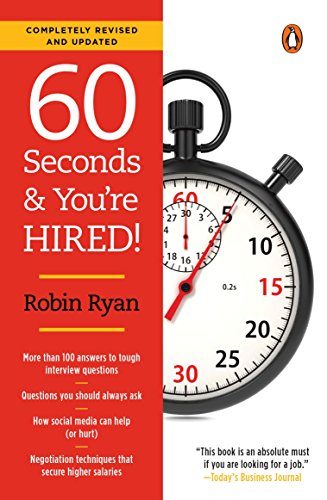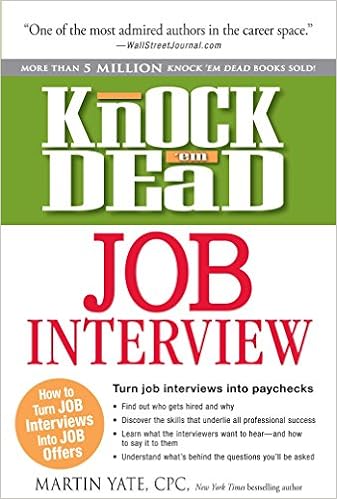We may earn a commission if you click on a product link and make a purchase at no additional cost to you. For more information, please see our disclosure policy.
Last Updated on April 21, 2025
Telephone interviews have become very popular as the first step in the interview process. Unfortunately, telephone interviews are probably the toughest type of interview. Without visual cues (from both the interviewer and the interviewee), it is very difficult to know when to pause for the next question and when you’ve nailed the answer. Telephone interviews require even more preparation than in-person interviews. One important advantage to telephone interviews is that you can (and should) refer to your notes during the interview (just be careful to pay attention and not pause for too long).
Typically, the first telephone interview is the “screening” interview (more often than not, with someone from HR). With the right preparation, there is no reason why you can’t get past this interview. The main purpose is to ensure you have the right qualifications and that your work experience supports what is presented on your resume. Here are some tips.
Feeling nervous about an upcoming telephone interview? Discover expert tips to boost your confidence and make a lasting impression. Let's turn that phone call into a job offer! #TelephoneInterview #InterviewTips #CareerAdviceClick To TweetUnderstand the Purpose of Telephone Interviews
Telephone interviews are often the first step in the
Create a Distraction-Free Environment
Choosing the right environment is crucial for a successful telephone interview. Find a quiet space where you won’t be interrupted or distracted by background noise. Ensure your phone has good reception and is fully charged. A distraction-free setting allows you to concentrate fully on the conversation, demonstrating professionalism and respect for the interviewer’s time.
Explore Career.io, the only Al and human-powered platform where you can find everything you need. For any step of your job search or career growth. All in one place.
Communicate Clearly and Professionally
Your voice is your primary tool during a telephone interview, so it’s essential to speak clearly and confidently. Articulate your words, use a friendly yet professional tone, and avoid speaking too quickly or slowly. Since the interviewer can’t see your body language, your vocal cues become even more important. Clear communication can significantly enhance your chances of progressing to the next stage.
Highlight Your Skills and Achievements
Without visual aids or body language, your words carry extra weight. Be prepared to discuss your key
Our AI Job Interview Coach is designed to help you train and excel in any job interview from the comfort of your home.
Handle Common Interview Questions Confidently
Anticipate common telephone interview questions and practice your responses beforehand. Questions may cover your background, why you’re interested in the position, and what you can bring to the company. Being well-prepared enables you to answer confidently and thoughtfully, demonstrating your genuine interest and suitability for the role. This preparation can significantly boost your interview performance.
Follow Up to Leave a Lasting Impression
After the interview, send a thank-you email to express your appreciation for the opportunity. Reiterate your interest in the position and briefly remind them of how your
Sending a powerful thank you letter after an interview can help put you ahead other candidates interviewing for the job so you get the coveted offer. Receive step-by-step instructions on how to write custom thank you letters for every interview.
Scheduling
Unlike an in-person interview, where you (hopefully) have the undivided attention of the interviewer, selecting when and where to have your telephone interview is as important as being prepared for the interview:
- Make sure you have a “quiet” place to have your phone interview. This can be difficult, but having it outside (with street noise), in a crowded location, where you might be interrupted, or at home (with kids &/or pets) are not the best choices but probably rule out most of your options. Find the best balance.
- Scout out your location a day or two in advance (at the same time of day) to ensure it will work out and to give yourself time to pick an alternative.
- Speaking of alternatives, the best-laid plans can sometimes not work out. Have an alternative location in the event your first choice is suddenly not suitable or not available.
- The time of day is also an important consideration. If there is any chance you might get stuck in the office and not get out on time, schedule the interview for first thing in the morning (before you get to the office if possible).
Using his twenty-five years of experience, New York Times bestselling author Martin Yate has established a set of rules for job interviews that is sure to get you noticed.
Preparation
There is no excuse for not being prepared for an interview, doubly so with a telephone interview. The usual preparation is required (see below), but keep notes and reference materials that can be leveraged during the interview:
- Have your resume handy, as well as the job specifications/listing (if available).
- Research those who will be interviewing you (LinkedIn is the best choice). You can also leverage LinkedIn to see if you have any connections who know the interviewer(s).
- Any material you may have sent to the company or Recruiter should be on hand (cover letter, list of
skills , references, etc.). - Company research – do it and have it handy.
- Your list of questions – there is nothing worse than not having anything to ask the interviewer. Keep an extra-long list in the event the interviewer answers some of the questions before they are asked.
- Their list of questions – Have a list of questions (with your answers) that might be asked.
- Make a list of
skills and experience that will convince the interviewer that you are the perfect candidate for the job.
The Interview
Some things to remember during the interview:
- Try not to answer questions with one-word answers – elaborate.
- Remember your 30-second elevator speech, you might need it as an introduction.
- Don’t go off on tangents, try to stay on topic and keep the interviewer focused on what you do best.
- While a long pause is not good, give the interviewer time to ask the entire question before responding.
- Try to avoid pauses on your side, if you need to think of an answer, now is the time your notes will come in handy – have them at your fingertips.
- “The Close” – don’t forget to thank the interviewer for their time and don’t forget to express your interest in the
Our AI Job Interview Coach is designed to help you train and excel in any job interview from the comfort of your home.
Related posts:
Joey Trebif is the pen name of Mark Fiebert, a former finance executive who hired and managed dozens of professionals during his 30-plus-year career. He now shares expert job search, resume, and career advice on CareerAlley.com.






